A few summers ago when I was a regular at Antibes’ municipal archives, I stumbled across a thick research paper that I’ve not forgotten. Within a simple plastic binding one scholar had amassed, en français, a battery of information about daily life here in this town of tourists, sunscreen and gelato. The timeframe of his research was World War II.
As 70th anniversary commemorations run the length of the Côte d’Azur, it seems an appropriate juncture to share a piece of that research paper. And what better way to consider Antibes’ day-to-day, wartime experience than to look through a narrow lens at one of its most vital, sensory and – especially for the French – soul-defining slices of life: food.
- In April 1940, seven months into World War II, Antibes’ boulangères only could make bread in larger, less stylised formats. There were no skinny ficelles, no zigzagging epis and no petits pains loaded with figs. Boulangères also had to skimp. A “one-kilogram” loaf could weigh, au maximum, 700 grams. A “500-gram” baguette weighed up to 300 grams.
- May 1940 brought the distribution of the first food-rationing cards.
- The same month saw new restrictions on food intake: No alcohol on Tuesdays, Thursdays and Saturdays. No butchers’ meats on Wednesdays and Thursdays. No meat at all on Fridays. And Sundays were the only chance for treats; all pâtisseries, biscuiteries, confiseries and glaces were officially banned for the rest of the week.
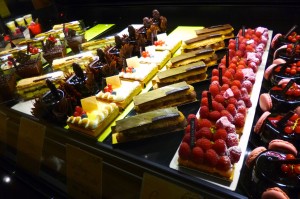
No sweets – not even a humble scoop of ice cream – except on Sundays? New sweet shops have opened in Antibes with a regular cadence recently, while every boulangerie, café and restaurant seems to double as pâtisserie and glacier. Even Antibes’ beaches get in on the act. Four kiosks anchor the long sandy stretch running outside our Bellevue’s windows. Beachcombers flock there for sustenance, especially for ice creams – pink, brown, white, green, orange and tan; on cones, in pots and on sticks; sprinkled with nuts, covered in chocolate, or deliciously plain, cold and smooth on the tongue. Ice cream is as expected in France as bloodsucking taxes.
In short, life during World War II is fairly unimaginable today – and that’s not only because, 70 years on, most of the world wasn’t even alive back then. And while this city – like most all of the Côte d’Azur really – fared better than many places in the war’s wrenching path, life was hardly easy.
- Real rationing began in Antibes in August. Shoppers had to limit the bread, sugar, coffee, meats, pasta and cheese that dropped into their baskets. The rules changed regularly through official notices. Soon the restrictions extended to practically all foods and basic necessities.
Fresh peas are the foodie’s springtime treat. What greater delight they must’ve been during the war! I first met Arlette Aussel several summers ago when steeped in research notes about Bellevue. She was a pretty, petite, almost-80-year old, and she and her husband visited our home, which – as small-world stories go – happened to be her own family’s rental home. Madame Aussel was about 10 years old at that time. The cautionary 1930s were merging into the more treacherous 1940s.
We toured through Bellevue’s rooms and corridors in a trip down memory lane. Things have changed significantly. Walls have moved. Rooms have grown or disappeared entirely. Eventually we walked out onto Bellevue’s upper terrace, a broad, open space that faces out to the sea. Mme Aussel’s face softened. It was the flicker of a memory.
I shelled petits pois here with my sister, she said. She smiled slightly, her blue eyes entranced, somehow searching for a deeper vision. During the war, she continued hesitantly and then smiled broadly. We were happy!
Peas were plentiful on that particular day. Her family would buy in bulk, canning the extras for winter – or for even harder times. Other days Mme Aussel and her sisters went down to Bellevue’s shoreline to fish for crevettes, succulent shrimp that nestled between the rocks. You did what you could. Sometimes you even bent the rules.
- Local storekeepers were hardly scrupulous about the regulations; they happily hid merchandise behind their counters for good clients. Meanwhile, certain doctors handed out prescriptions for “special diets” perhaps a bit too easily.
The Milton household next door to Bellevue was known to have a particularly well-stocked food cellar. But Georges Milton was a popular singer and actor. He was recognized everywhere in town.
Mme Aussel – who today would be the last one to break the rules – confessed to her own bouts of circumvention. A member of the Jeannettes (the equivalent of Brownies in the US), she joined her troop most Thursdays on the grounds of a nearby stately home, Le Bosquet. The young girls stole figs from Le Bosquet’s laden trees. They pulled carrots from the estate’s gardens and ate them raw. (And as the small-world story continues, Mme Aussel herself now inhabits that very home.
- Adults had an official means to soften the grip of rationing. By collecting non-ferrous scrap metal, they earned extra rations of wine. The community unsurprisingly had amassed a hulking mountain of the scrap metal by the time autumn 1941 rolled around.
On one occasion food appeared almost magically as the young Mme Aussel walked to school. Tracing the rocky, algae-strewn shoreline from Bellevue into town – the same stretch that today boasts the long, sandy beaches and four snack kiosks – the schoolgirl found . . . oranges!
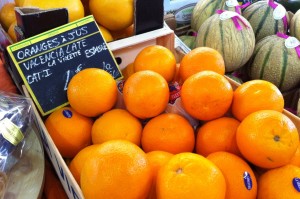
At this point in the war, Mme Aussel said, there was no fruit to eat. But right there at her feet, the shore was full of oranges!
A boat had sunk in the Mediterranean and this part of its cargo washed ashore to the rocky shoreline of Antibes. With her school friends, Mme Aussel broke into the precious balls of citrus in great anticipation. She cringed in retelling this part of the story: The oranges, she said, were all salty!
The war tore on, and food supplies were a perpetual and worsening problem.
- By May 1943, new rations brought only 1,500 calories a day to the frame of each Antibois. On distribution days the queues outside food shops grew, as did the black market.
Libération – the glorious day that fell on August 24, 1944 for this town – brought the heartiest reasons to celebrate. Soon there was another:
- White bread, that staple of French society, was available from the fourth day after Libération.
But rebuilding takes time. The days remained oppressive.
- Bread was available, but rations continued. The prices of food and household goods climbed.
Life was difficult for a very long time after the war, centenarian Lucienne Frey told Philippe and me during last week’s interview. We kept a carte d’alimentation (a food-rationing card), she said, for at least two years after the war. I’m not sure how long exactly. It included quantities of bread and meat you could buy.
At the same time, you could find ways to lighten the burden.
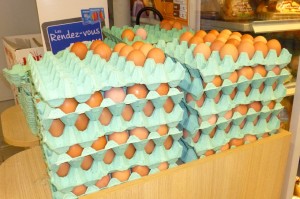
There was a big farm in Antibes, Mme Frey said. I’d go buy milk there directly. They’d put the milk in demi-litre and litre bottles. It was good to go out to the countryside, she said, conjuring up the sense of freedom the airy fields seemed to offer from the recovering city of Antibes.
But the farmer didn’t give everything to everyone, Mme Frey remembered. They put a little aside. The farmer might say you’d get eggs next time. Six eggs – and you’d be very contente.
- Coastal activity had been forbidden in certain areas during the Occupation, so the waters around Antibes had repopulated nicely. Fishermen scooped the bounty into cotton nets. Sardines ranked as the favourites.
Jean-Claude Logut’s family rented out our Bellevue directly after the war years when he was a young boy. Now in his mid-70s, the hearty Mr Logut shared an apéritif with Philippe and me on Bellevue’s terrace a couple summers ago. He stood at the terrace railing, looking out into the bay.
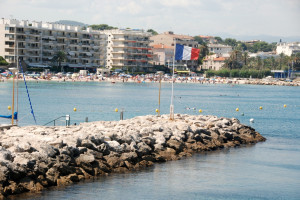
Some nights when the tide was high, he and his younger brother Philippe treaded over the rocks and algae at Bellevue’s shoreline and took the family’s small boat to “go fishing.” The young boys were creative. From a nearby building site they took bricks, the kind with six holes bored through their interiors, and placed the bricks in nooks of the stone jetty at the neighbouring Port de la Salis.
The next morning, Mr Logut said delightedly as the memory replayed in his mind, very early when the tide was still low, we returned to the bricks and found fish. They were small minnows . . . about this long – and here he made a four-inch gap between his thumb and forefinger – but they were fish!
Size hardly mattered. These fish represented ingenuity, victory and an extra, small ration all rolled up in one.
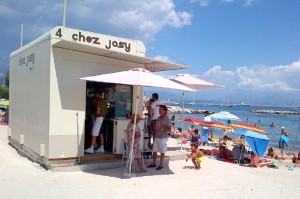
Time marches on. The four beach kiosks outside Bellevue do a thriving trade this summer, at least on the sunny days. My favourite hut is the furthest from our home, but the best thing at Chez Josy isn’t its Magnums, Cornettos or Carte d’Or ice creams. It’s the owners’ homemade pan bagnat – basically a salade niçoise (tuna and vegetables (finely diced here) with slices of hard-boiled eggs and tomatoes and anchovies) mounded on a fresh, French bun. Never, Chez Josy confirms proudly, do they skimp by mixing in onions. Crunchy, zesty and salty, this pan bagnat is even tastier eaten by the sea.
With food so plentiful now in the 21st-century, good French cuisine comes with a little (often deserved) French culinary attitude – whether at a Michelin-starred restaurant or a humble beach kiosk. I order my pan bagnat from a lanky young man with cropped, curly brown hair. While he’s busy preparing the sandwich, I grab his attention again. Would you mind adding some mustard? I ask.
Oh non, madame, the young man says. C’est pas possible. Non, c’est ne vraiment pas possible! It’s really not possible. Il faut goûter d’abord. You have to taste it first!
In modern French times, food still matters. It remains a very big deal.
I savour my pan bagnat – without mustard – on the beach wall as the bay splashes relentlessly onto the sand below. Just as it is, the sandwich is perfect.
And this pan bagnat is certainly a whole lot tastier than salty oranges. It was right here, beneath my dangling feet, that oranges floated ashore some 70 years ago – ages past, before there were kiosks and ice cream, parasols and suntan lotion.
Let me not forget.

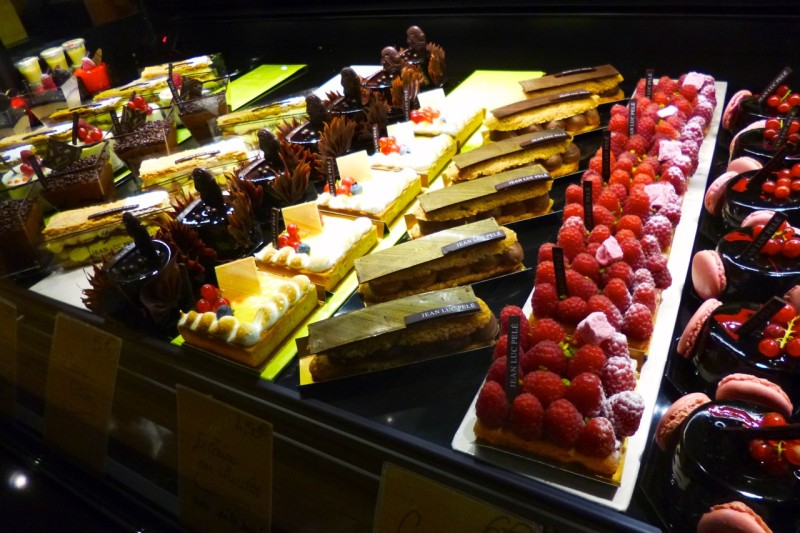
What an enlightening read, as always. Your closing lines are often memorable and this is no exception. Furthermore, it tugs at my heart. Thank you for highlighting those years when our ancestors did much to make our lives easier today! Let ME not forget!
J, we have so enjoyed your posts for the last few weeks.they have sustained us on our travels in the Far East. Here too food is now plentiful and delicious but apparently wasn’t always so. A different type of WWII here…lest we forget….
Well put as ever, Sarah! Always great to hear from you. Enjoy your travels out East.
Well said, Barbara Peterson, and well written as always, Jemma!
J., YOU DO NOT KNOW ME BUT THIS WAS GREAT FUN TO READ. JUST WANT TO ASK IF YOU KNEW THAT WE HAD RATIONING IN THE STATES TOO. I WAS AN INFANT AT THE TIME AND MY MOTHER KEPT MY RATION BOOK WHICH I STILL HAVE. IT WAS NOT AS SEVERE AS EUROPE, ENGLAND IN PARTICULAR, BUT BUILDING SUPPLIES, CARS,RUBBER, GASOLINE,METALS, AND YES, FOOD WERE ALL CONTROLLED STRICTLY. MY PARENTS BUILT A HOUSE IN 1945 (AFTER THE WAR) AND HAD A TERRIBLE TIME GETTING COPPER FOR PLUMBING, WOOD FOR EVERYTHING, GLASS FOR WINDOWS AND SHEET METAL FOR DUCTING. YOU COULDN’T BUY WASHERS, REFRIGERATORS, STOVES,ETC. BECAUSE THE RAW MATERIALS FOR THEM WERE ALSO THE RAW MATERIALS FOR WEAPONRY.THEY HAD TO SCROUNGE FROM SOURCES IN OTHER STATES TO COMPLETE THEIR HOME AND IT TOOK MUCH LONGER THAN IT NORMALLY WOULD HAVE. INDUSTRY HAD RESET ITS MANUFACTURING LINES FOR WAR MATERIAL PRODUCTION. EVERYTHING HAD GONE INTO THE WAR EFFORT AND SUPPLYING OUR TROOPS AND OUR ALLIES WHICH WAS ONLY RIGHT. EVEN THOUGH THE WAR WAS OVER, INDUSTRY HAD TO RETOOL FOR THE COMMERCIAL MARKET AND IT TOOK A COUPLE YEARS TO GET GOING AGAIN. THERE IS A LOT MORE THAN WAS ASKED OR DEMANDED OF THE CITIZENRY. IT WAS A DIFFERENT TIME AND SACRIFICES NEEDED TO BE MADE TO STOP A DREADFUL FORCE LOOSE IN THE WORLD. I SINCERELY HOPE WE AND EUROPE STILL HAVE THAT DEGREE OF RIGHTEOUS DETERMINATION AS THERE ARE NOW AND ALWAYS WILL BE OTHER FORCES OF EVIL TO CONFRONT.
A really big merci, Carol, for your thoughtful and riveting comments. They make me reflect back on the earliest posts of this summer when life somehow was colored by the lack of WiFi. There are essentials in life, of course, and then we must remember they all are relative! Thank you again for sharing these details and aspirations with other French Lessons readers.